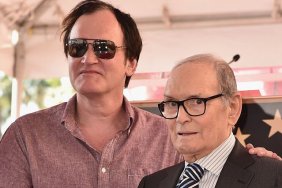Criticizing movie scores is a tricky proposition. If a score does its job correctly – so the adage goes – you won’t notice it. A good movie score will mesh so strongly with the on-screen images that the two will become – in the best of circumstances – a single piece. Thus, movie score independent of the film is accompanies is a different animal altogether. A severed score tends to play, then, as background music in the room. It rarely enhances mood, as the music moves in such an un-musical fashion; the timing and rapidly vacillating musical moods are dictated by something you’re not seeing. So any independent musical score, no matter how great, runs the risk of becoming wallpaper.
Check Out: SoundTreks | The 2016 Oscar-Nominated Songs
The more notable and enjoyable movie scores buck this trend. If audiences can leave the theater humming the theme of the movie they just saw, but still had enjoyed the film without noticing the music, then a score has done its job. This is why Ennio Morricone, John Williams, James Horner, Bernard Herrmann, and Danny Elfman (to an extent) are often considered among the best movie composers. They know how to strike that balance. Two of those people are up for Oscars this year. Two are dead.
We here at SoundTreks, partly as a definitive study and partly as an intellectual exercise, has listened to the complete scores of the five films nominated for this year’s Academy Award for Best Score, and will try to suss out the character of the respective musical scores, and make a prediction as to who will win the Oscars come awards night. Batons in the air, everyone…
Carol – Carter Burwell
I’m surprised Carter Burwell was nominated for his work on Todd Haynes’ Carol, when his work on last year’s Anomalisa was so much better. The score to Carol is quiet, winsome, and contemplative. It’s an insidious, almost melancholy score. Carol is a love story about two women who fall in love in a posh 1950s setting, so exhibiting good manners while keeping one’s emotions at arm’s length is, rightfully, the overwhelming tone of the score. There is hurt in the music. Carter Burwell was also clearly inspired by Philip Glass, so there is a meditative repetition to the music throughout. Nothing hummable here, but there is a lot of ache. It works well when watching the film, but independently, it’s a bit of a drag.
Sicario – Jóhann Jóhannsson
Sicario is a morally tricky drama about a drug war in Mexico, and the way it’s been eating away at the character of the cops on the case, as well as the country in general. It’s presented as a dour, cynical, dirty, and intense thriller full of violence and gunfire. As such, the score is a lot of booming, jumping drum pounds. While Sicario is quite a good film, I feel like I’ve heard scores a lot like this one in other thrillers, many of a much lower prestige level. Jóhann Jóhannsson, an Icelandic composer, has previously worked on much slower, quieter movies like The Theory of Everything, Prisoners, and Foxcatcher. It’s nice to see he can stretch when it comes to genre, but perhaps his score is too efficient to stand out as something extraordinary.
The Hateful Eight – Ennio Morricone
Ennio Morricone, pushing 90, has hundreds of credits to his name, and he is a buzzword amongst cinephiles the world over. Including The Hateful Eight, he has been nominated for six Academy Awards, and won an honorary Oscar in 2007. His work is always recognizable, but full of his own distinct character. To this day, he is writing music with energy and wickedness. Since this critic works for Quentin Tarantino, the director of The Hateful Eight, I cannot, in good conscience, make a comment on the film itself. I can say that Morricone is certainly deserving of an Oscar after so many decades of fine work with no recognizable dip in quality or passion.
Bridge of Spies – Thomas Newman
Steven Spielberg’s Bridge of Spies is a relatively lighthearted romp (despite the subject matter) about a real-life hostage negotiation between the U.S. and Russia during the height of the Cold War. While Spielberg has traditionally worked with John Williams, Thomas Newman gives his score a lot of similar-enough omph, only with his more down-to-earth friendliness. The tone of Bridge of Spies must have been a tricky thing to nail, as it deals with forthrightly political themes and actual danger and death, but it’s not a dreary or hefty drama. In fact, it’s almost lightweight the way it’s presented. The tone of the movie, then, can 100% be heard here. That’s a good score.
Star Wars: The Force Awakens – John Williams
John Williams has written the music for over 150 projects, and has won five Academy Awards, starting in 1972 for his work on Fiddler on the Roof. His famous score for Star Wars is one of the most recognizable pieces of movie music in the history of cinema, and his name is closely associated with a certain kind of bold adventure, thanks to his association with movies like Jaws, Superman, Raiders of the Lost Ark, Jurassic Park, Harry Potter, and the Olympic games. John Williams has not won an Academy Award since 1993’s Schindler’s List. His work on Star Wars: The Force Awakens – maybe the 30th time this theme has been used in a Star Wars product – is no less impressive than it was back in 1977, and it manages to quote familiar themes whole still feeling bold and modern. John Williams knows too much and has been working too long to do bad work on something like this.
Who Will Win?

Disney
I think this may be Williams’ turn to win. For the sixth time. There is far too much affection for Star Wars floating around in the pop consciousness – especially right now – and much of that affection can be perfectly encapsulated by Williams’ famous score. He knows how to quote his own work (you’ll hear familiar themes creeping in everywhere), but he also knows how to emphasize new emotional moments. I wish he had invented new themes for Star Wars: The Force Awakens (like he did with The Imperial Death March in The Empire Strikes Back), but what he did was pretty good.
Also, Star Wars: The Force Awakens was the most-watched film of the year, and it was only nominated in five categories, mostly technical categories. I think the Academy is too savvy to let a super-popular Star Wars movie go past them without giving it several notable awards. Star Wars: The Force Awakens will win the Academy Award for Best Score. Now get back to me in February, and tell me if I was right.
Top Image: ABC
Witney Seibold is a contributor to the CraveOnline Film Channel, and co-host of The B-Movies Podcast. He also contributes to Legion of Leia, and Blumhouse. You can follow him on “Twitter” at @WitneySeibold, where he is slowly losing his mind.











